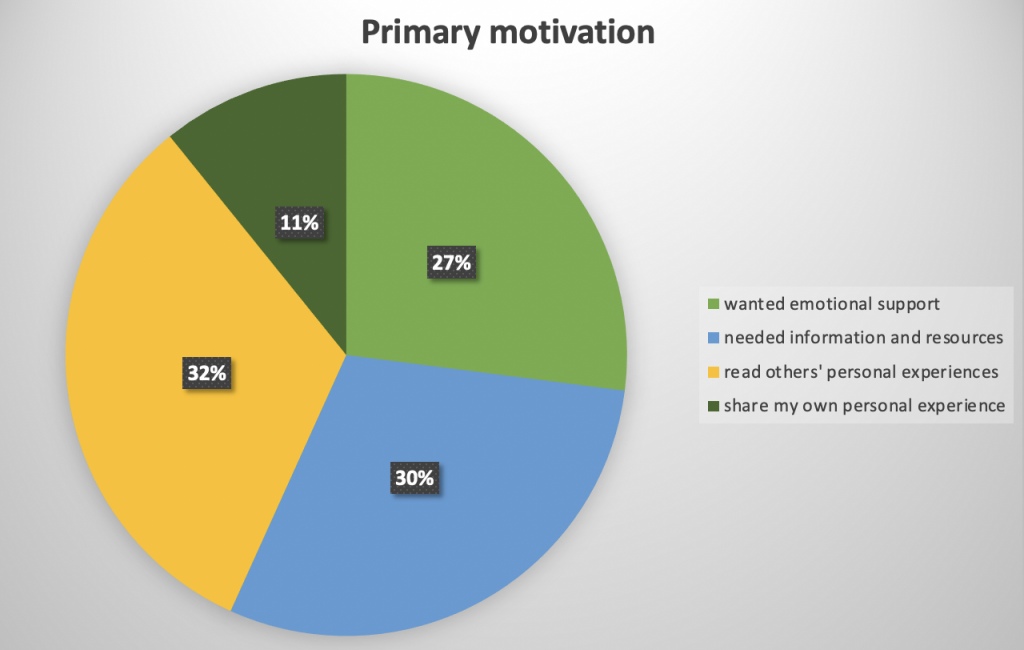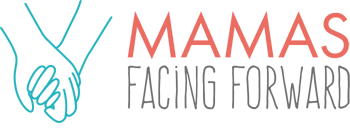This article is based on a presentation I gave at the virtual American College of Rheumatology Annual meeting on November 8, 2020. See Part 1 of this presentation: Survey Shows Moms with Chronic Illness Need More Support From Their Doctors.
In a previous article I shared some of the critical gaps in reproductive health education for women with chronic illness. Here I want to take a look at the role played by online communities – specifically the Mamas Facing Forward Facebook group.
After 5 years of moderating this group, I wanted to understand what sort of role Mamas Facing Forward is playing in the chronic illness community and in the experience of individuals. I teamed up with two qualitative researchers – Courtney Wells and Kristine Carandang. Together we worked to develop a survey with IRB approval from the University of Wisconsin – River Falls and asked for voluntary participation in the group.
In their open-ended answers, the 37 women who answered our survey discussed a full range of family planning stages. Some were merely considering pregnancies, others were wanting to conceive a child – including those who had been diagnosed between children – and those discussing motherhood covered a range of ages from infants, to toddlers, to older children. Participants also discussed various topics, including medications, breastfeeding, adaptations or life hacks, and adjusting to a new diagnosis.
Primary Motivation for Joining

When we asked participants to identify their primary motivation for joining the group most responses were pretty evenly split between three of the options: 10 women primarily wanted emotional support; 11 women primarily needed information and resources, and 12 women primarily wanted to read others’ personal experiences. The remaining 4 primarily wanted to share their own personal experiences.
Community & Hope
In their open-ended answers, many participants spoke about not wanting to feel isolated or alone, and shared how they wanted to be connected to real people going through similar experiences. We linked this desire for emotional support with the idea of community. While only 10 women chose emotional support as their primary motivation for joining the group, more than three quarters of the women included at least one answer that we thought discussed community.
Here are some examples:
“As a younger person in their 20s navigating my diagnosis and ‘grieving’ my body’s former capabilities, it was difficult to find anyone I knew in real life who understood how I felt. I felt very isolated. As I have aged and am now…ready to start trying to conceive, I wanted to be part of a community that really reflected what my journey as a mom would be with chronic illness.”
“I’m still new to the group but I already feel part of the family and I have received a lot of emotional support. I’ve even been able to offer support to others already too.”
“This group has been an amazing and positive sense of support for me. Soon after being diagnosed I found Mariah’s blog and then she started this group, which has been extremely helpful over the years. I wish it would have been here when I had a newborn and a new diagnosis, but I am glad it can be a resource for others.”
While our analysis is still preliminary, we think that having access to an understanding and supportive online community may be linked to some patients finding hope in their real lives. Here are a few instances where respondents linked the community with hope for their own futures:
“This group gave me all the hope I needed when I was first diagnosed. Before this group I thought I wasn’t going to be able to have any more kids or be the mother I wanted to be.”
“When I was first diagnosed I was concerned my childbearing days were over. I would like one more child and this group has given me hope and some good information that pregnancy with RA is possible and happens all the time.”
Information: Outside Resources & Immediate Insider Perspective
The access to information mentioned in that last quote is part of what we see as the second potential role of this online community. More than 80% of participants mentioned using the group as a source of information.
In some cases, the group informed a member about an outside resource that answered her questions:
“Someone recently shared an article by the American College of Rheumatology. It gave their guidelines and recommendations for treatment during pregnancy. I actually just gave the article to my OB…The article and the ACRs recommendations are greatly informing my care during this pregnancy. Without this group, I wouldn’t have even known those guidelines existed. And neither would my OB.”
In addition to sharing outside resources, participants discussed the group itself providing access to an immediate insider perspective – information that was available at the time it was needed and provided by someone with personal experience. Here are some examples:
“I was newly diagnosed with a baby and trying to breastfeed and in pain. I needed answers without having to spend hours on research. In my postpartum haze and pain, I didn’t have energy or hours to spare.”
“The instant support – being globally accessible means no matter what time you post someone somewhere will be reading your message…and sending tiny sparks of hope.”
“I was looking to connect with others in similar situations…Specifically, I was hoping to find information about…tools, techniques, and products that would make child care less physically straining. I couldn’t find many resources or much information online.”
Empowerment: Practical Advice & Improved Healthcare
The final theme we’ve seen emerging from the data is the idea of empowerment – where group members have taken action in their real lives based on information they gathered from the group.
In my own personal experience, I didn’t have anyone to ask when I had parenting problems specific to my RA – so one thing I think is really unique about this group is the sort of “hive mind” it creates. People can share specific problems, and others can chime in with their past experience, so every mom isn’t reinventing the wheel on her own.
Here’s a simple example:
“One of the best pieces of information I got was from a post about sippy cups for kids. All the ones I bought for my first kid suddenly were extremely difficult for me to open and put together. I got a great recommendation of a cup that was easier to open and has been a lifesaver.”
To some a sippy cup may seem pretty insignificant, but any mom knows it’s actually a huge part of daily life with a toddler. There are about a million different kinds of sippy cups – so instead of having to research or buy and try a bunch of them, this mom was able to get a quick recommendation and move on with her life more easily.
Here’s another one:
“A mom recommended a product to help me get my child unbuckled from her car seat since I can hardly use my hands from the pain.”
The inability to get your child safely in and out of a car seat can obviously have a huge impact on a mother’s daily life, potentially stranding her at home – so knowing about simple products that can help can be hugely beneficial. One more:
“Most importantly, [I] learned to give myself grace on hard days.”
This one really speaks to me because there are so many unreasonable expectations placed on mothers these days, and moms dealing with their own health issues can have an even harder time dealing with guilt.
Participants also reported feeling empowered by the group when it came to their own health. This included learning about treatment options they otherwise wouldn’t have known about, as well as how to overcome hurdles in gaining access to treatments. Here are some examples:
“I was able to get the new… [injectable biologic]formula that doesn’t sting from hearing about it in the group”
“My insurance company refused to approve the biologic medication my doctor prescribed…I was able to network with women in the group who had experienced the same thing. They told me what to do. And my medicine was finally approved. That medication has changed my life.”
This theme of empowerment also included participants who reported improved communication with their own doctors as a result of what they learned in the group.
“As I started seeing posts from other people with my condition…I was able to use this information to be more informed when I spoke with my own medical team and ask better questions during appointments.”
“Postpartum with my first child, I was experiencing severe symptoms…As I was ready to give up on finding a doctor who would believe me and treat me, I found this group. Their tips on getting doctors to listen, diagnose, and treat literally saved my life.”
I have to admit that I really love these stories of empowerment, because my main goal in starting the group was to help create a better experience for the next new mom. I’m hopeful that by sharing these survey results with healthcare professionals, they’ll start doing a better job meeting the broad range of needs that moms and moms-to-be with chronic illness have when it comes to their healthcare. I also hope they’ll encourage their patients to seek support from others in similar situations, such as by joining our support group.
As for me, I’ll continue to do whatever I can to create more support for this unique population of patients.

